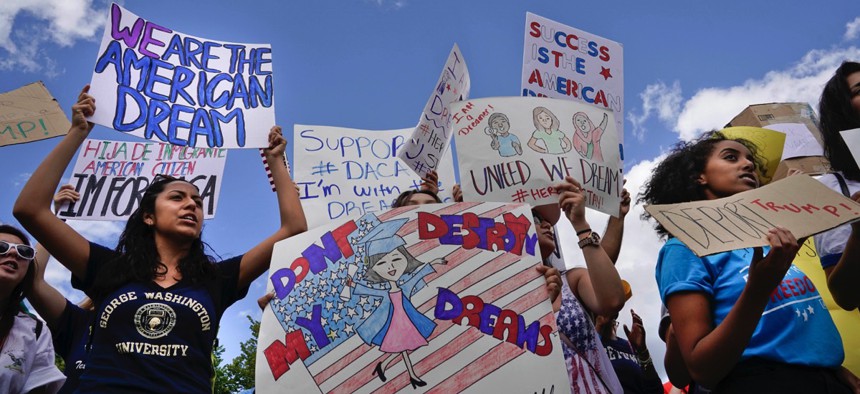Wisconsin Mayor Fears Concessions on DACA Could Threaten Other Immigrants

Supporters of the Deferred Action for Childhood Arrival program demonstrate on Pennsylvania Avenue in front of the White House in Washington, D.C. on Sept. 9. Pablo Martinez Monsivais / AP Photo

Connecting state and local government leaders
“We’re not willing to trade DACAs for their parents, DACAs for their siblings, DACAs for a wall,” according to Madison’s Paul Soglin.
Many state and local officials are calling for a “clean” DREAM Act, one that ensures a pathway to citizenship for Deferred Action for Childhood Arrivals recipients without making trade-offs with Republicans for increased immigration enforcement or border wall funding.
DACA recipients, or Dreamers, are undocumented immigrants brought to the U.S. as children by their parents and protected from from deportation—a status 850,000 people have sought since June 2016.
Many have had children of their own, U.S. citizens, and all are justifiably skeptical of reports President Trump is committed to reaching a DACA deal that will allow Dreamers to remain in the country, no strings attached.
“We want a clean bill. We don’t want a trade,” Paul Soglin, the mayor of Madison, Wisconsin said during a conference call on Wednesday with activists. “We’re not willing to trade DACAs for their parents, DACAs for their siblings, DACAs for a wall.”
Soglin, a Democrat, believes Trump’s decision to end DACA must be immediately righted if other migration issues are to be resolved. He blamed a longstanding “false narrative,” racial in origin, that “there are people who are on the dole. There are people who are being subsidized, and there’s this resentment in some quarters that the rest of us, who are working hard, shouldn’t have to pay for those people.”
The deportation of Dreamers would be detrimental to the U.S. economy, Soglin said, down to Wisconsin’s dairy industry, where as many as 50 percent of workers are immigrants or the children of immigrants. If herds aren’t milked on a regular basis, the national milk supply and cow health would suffer.
Mayors like Soglin and immigration activists are among those pressuring their Republican governors and members of Congress, like House Speaker Paul Ryan from nearby Janesville, to side with constituents over out-of-state donors on the DACA issue. Ryan notably shifted his moderate stance on immigration back in 2006 to support mass deportations and then back again, indicating he’s “sensitive to the political winds,” said Christine Neumann Ortiz, director of the Voces de la Frontera immigration activist group.
Concessions bills “use immigrants as a bargaining chip,” Neumann Ortiz said, and cave to calls from the far-right to “institute white nationalist policies of mass deportation.”
Voces de la Frontera has staged sit-ins outside Ryan’s Janesville office and prayed with fellow Catholics in his church to “call him to act on his religious values,” Neumann Ortiz said.
In Madison, immigrants are integral to the tech and healthcare industries.
Ilse Merlin, a DACA recipient, activist with Youth Empowered in the Struggle and Ryan constituent, was brought to the U.S. as a 4-year-old by her 19-year old mother, who she calls an “original Dreamer.” Offered a full ride to college through the University of Wisconsin-Madison’s PEOPLE Program if she was accepted, she ultimately missed out because she lacked a Social Security number.
“I began to cry, and we didn’t think it was fair at all because I had worked so hard for something,” Merlin said. “And I was still being rejected.”
Since then, Merlin has obtained an associate degree in early childhood education but is ineligible for financial aid to continue her studies at Concordia University and would owe out-of-state tuition as an immigrant student.
Coupled with escalating attacks on immigrants and racially charged vandalism in Madison in the Trump era, cases like Merlin’s are leading friends, families, employers, religious leaders, and teachers to wake up and unite as a community behind Dreamers.
Studies show a majority of Americans support legislation that would allow Dreamers to remain in the U.S., which strengthens the position of those seeking a clean path to citizenship.
“There’s nothing to lose because this is so popular,” Neumann Ortiz said.
In Tennessee, Gov. Bill Haslam and state Attorney General Herbert Slatery, both Republicans, have urged Congress to pass the DREAM Act. Slatery was one of the 11 state AGs who threatened to sue the Trump administration if it did not end DACA by Sept. 5. Slatery’s change of heart came after he recognized the “human element” to the situation.
Ninety-one percent of Dreamers nationally are currently employed, said Lisa Sherman-Nikolaus, Tennessee Immigrant and Refugee Rights Coalition policy director, on a separate call, and Tennessee would lose $347 million in gross domestic product if they were deported.
Her organization has marched outside Slatery’s office as well as those of Republican U.S. senators Lamar Alexander and Bob Corker in an effort to urge them to back the bipartisan DREAM Act.
Dulce Castro, a DACA recipient and freshman nursing student at Cumberland University in Tennessee, is the first member of her family to go to college, but her path was admittedly a narrow one. A top-five student in her high school class, she fears compromise on DACA would put her parents at risk.
About 83,000 applied for and received DACA status in the Volunteer State, Dreamers who have the backing of the Knoxville Area Urban League, Urban League of Greater Chattanooga and Tennessee State Conference NAACP.
Those organizations and others don’t want to see Dreamers “lose the right to live and work freely,” said KAUL President and CEO Phyllis Nichols, but rather “earn better wages, own homes and contribute to quality of life.”
Dave Nyczepir is a News Editor at Government Executive’s Route Fifty and is based in Washington, D.C.

NEXT STORY: 2017 Navigator Awards Finalists: Agency and Department Leadership





